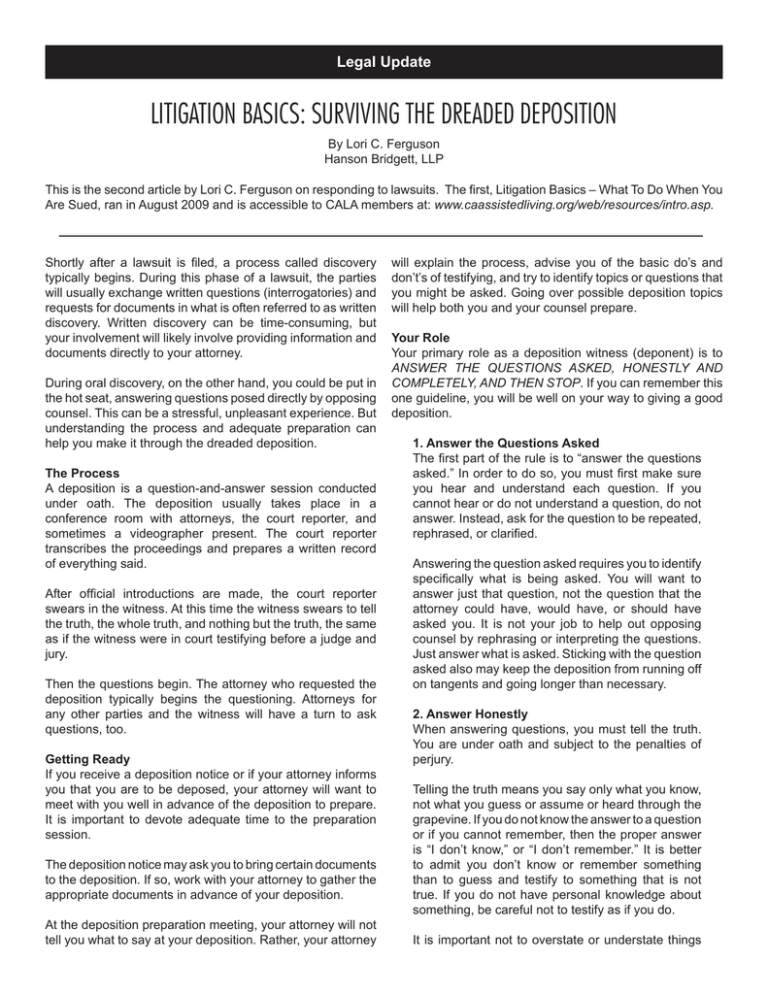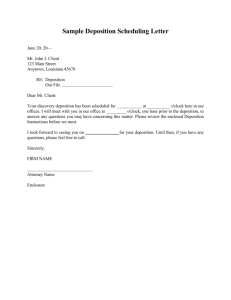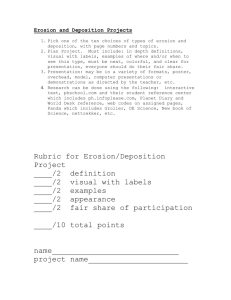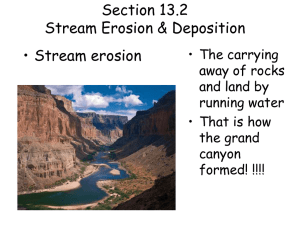litigation basics: surviving the dreaded deposition
advertisement

Legal Update LITIGATION BASICS: SURVIVING THE DREADED DEPOSITION By Lori C. Ferguson Hanson Bridgett, LLP This is the second article by Lori C. Ferguson on responding to lawsuits. The first, Litigation Basics – What To Do When You Are Sued, ran in August 2009 and is accessible to CALA members at: www.caassistedliving.org/web/resources/intro.asp. Shortly after a lawsuit is filed, a process called discovery typically begins. During this phase of a lawsuit, the parties will usually exchange written questions (interrogatories) and requests for documents in what is often referred to as written discovery. Written discovery can be time-consuming, but your involvement will likely involve providing information and documents directly to your attorney. During oral discovery, on the other hand, you could be put in the hot seat, answering questions posed directly by opposing counsel. This can be a stressful, unpleasant experience. But understanding the process and adequate preparation can help you make it through the dreaded deposition. The Process A deposition is a question-and-answer session conducted under oath. The deposition usually takes place in a conference room with attorneys, the court reporter, and sometimes a videographer present. The court reporter transcribes the proceedings and prepares a written record of everything said. After official introductions are made, the court reporter swears in the witness. At this time the witness swears to tell the truth, the whole truth, and nothing but the truth, the same as if the witness were in court testifying before a judge and jury. Then the questions begin. The attorney who requested the deposition typically begins the questioning. Attorneys for any other parties and the witness will have a turn to ask questions, too. Getting Ready If you receive a deposition notice or if your attorney informs you that you are to be deposed, your attorney will want to meet with you well in advance of the deposition to prepare. It is important to devote adequate time to the preparation session. The deposition notice may ask you to bring certain documents to the deposition. If so, work with your attorney to gather the appropriate documents in advance of your deposition. At the deposition preparation meeting, your attorney will not tell you what to say at your deposition. Rather, your attorney will explain the process, advise you of the basic do’s and don’t’s of testifying, and try to identify topics or questions that you might be asked. Going over possible deposition topics will help both you and your counsel prepare. Your Role Your primary role as a deposition witness (deponent) is to ANSWER THE QUESTIONS ASKED, HONESTLY AND COMPLETELY, AND THEN STOP. If you can remember this one guideline, you will be well on your way to giving a good deposition. 1. Answer the Questions Asked The first part of the rule is to “answer the questions asked.” In order to do so, you must first make sure you hear and understand each question. If you cannot hear or do not understand a question, do not answer. Instead, ask for the question to be repeated, rephrased, or clarified. Answering the question asked requires you to identify specifically what is being asked. You will want to answer just that question, not the question that the attorney could have, would have, or should have asked you. It is not your job to help out opposing counsel by rephrasing or interpreting the questions. Just answer what is asked. Sticking with the question asked also may keep the deposition from running off on tangents and going longer than necessary. 2. Answer Honestly When answering questions, you must tell the truth. You are under oath and subject to the penalties of perjury. Telling the truth means you say only what you know, not what you guess or assume or heard through the grapevine. If you do not know the answer to a question or if you cannot remember, then the proper answer is “I don’t know,” or “I don’t remember.” It is better to admit you don’t know or remember something than to guess and testify to something that is not true. If you do not have personal knowledge about something, be careful not to testify as if you do. It is important not to overstate or understate things in your deposition by, for example, saying they happen “never” or “always.” Qualifying your answers with words like “usually,” “generally,” “typically,” “it depends,” and “not necessarily” can help you avoid exaggerating with unwarranted absolutes. 3. Answer Completely You must also answer completely. A half-truth is insufficient. When answering questions, it is important to say enough so as not to mislead. For example, in a deposition in a lawsuit about a choking incident, you may be asked what was served for dinner on the date in question. If chicken, rice, and beans were served, it would be inappropriate to answer simply rice and beans. 4. And Then Stop Just as answering completely is important, so is stopping when you have said enough. Once you have answered the question honestly and completely, there is no need to continue talking. Simply stop and wait for the next question. You do not want to prolong the deposition by talking about issues not asked, nor do you want to open the door to areas of inquiry that are irrelevant or simply not thought of by opposing counsel. You may have lots of things to say about the subject matter of the lawsuit. At the appropriate time, you will have your chance to share that information when your attorney asks you questions in deposition or at trial or asks you to testify in writing. It is important to remember, too, that it is not your job to win the case during your deposition. Your sole responsibility during the deposition is to answer the questions asked truthfully, to the best of your ability. Practical Considerations There are a few other practical things to keep in mind about depositions. Remember that the official record is usually the written transcript. For that reason, it is important to answer verbally instead of with nods or shakes of the head. Answer “yes” or “no” instead of “uh huh” or “nuh uh.” Also, wait for the full question before answering. It is difficult for the court reporter to transcribe people talking over one another, and the resulting transcript is often confusing. Take time to think before answering questions. Plan your answer so it is as succinct as possible. Taking your time before blurting out an answer also gives the attorneys time to state any objections to the question. If an objection is stated, don’t answer until you are told to do so by your attorney. Usually, objections are just stated for the record, and you will be allowed to answer once the objection is stated. Occasionally, however, your attorney may instruct you not to answer because, for example, the question seeks privileged information. If your attorney instructs you not to answer, follow the advice. Although a deposition occurs in a relatively informal setting and the people involved may be friendly with one another, don’t forget that the deposition is a legal proceeding. Don’t become chatty with opposing counsel on or off the record. And never use humor or sarcasm in your responses. Try your best to maintain your composure even if the proceedings become somewhat heated. Answer questions in a polite and professional manner. If the deposition questions become abusive, let your attorney deal with the situation. A deposition is not an endurance contest. If you are tired, hungry, thirsty, or just need to step away to collect your composure, ask for a break. Breaks usually occur after an answer has been given and before a new question is posed. The exception is when you need to confer with your attorney regarding whether a pending question may be answered or whether it is subject to a privilege. Your attorney will want to meet with you before you are deposed to go over practical suggestions like these. He or she may also help you prepare by role-playing to get you used to the deposition format. Take advantage of this opportunity. Time preparing is time well spent. If you prepare and answer the questions asked, honestly, completely, and then stop, the deposition, although perhaps still dreaded, will go smoothly.



